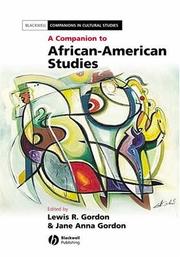| Listing 1 - 10 of 199 | << page >> |
Sort by
|
Book
ISBN: 0140180532 Year: 1965 Publisher: London : Penguin books,
Abstract | Keywords | Export | Availability | Bookmark
 Loading...
Loading...Choose an application
- Reference Manager
- EndNote
- RefWorks (Direct export to RefWorks)

ISBN: 0140183841 Publisher: London : Penguin Books.
Abstract | Keywords | Export | Availability | Bookmark
 Loading...
Loading...Choose an application
- Reference Manager
- EndNote
- RefWorks (Direct export to RefWorks)
#KVHA:American Studies --- Vocabulary --- Lecture
Book
ISBN: 9026043252 Year: 1971 Publisher: Kapellen : De Sikkel,
Abstract | Keywords | Export | Availability | Bookmark
 Loading...
Loading...Choose an application
- Reference Manager
- EndNote
- RefWorks (Direct export to RefWorks)
Book
ISBN: 0824882407 Year: 2017 Publisher: Honolulu : University of Hawaii Press,
Abstract | Keywords | Export | Availability | Bookmark
 Loading...
Loading...Choose an application
- Reference Manager
- EndNote
- RefWorks (Direct export to RefWorks)
Among the many groups of Chinese who migrated from their ancestral homeland in the nineteenth century, none found a more favorable situation that those who came to Hawaii. Coming from South China, largely as laborers for sugar plantations and Chinese rice plantations but also as independent merchants and craftsmen, they arrived at a time when the tiny Polynesian kingdom was being drawn into an international economic, political, and cultural world.Sojourners and Settlers traces the waves of Chinese immigration, the plantation experience, and movement into urban occupations. Important for the migrants were their close ties with indigenous Hawaiians, hundreds establishing families with Hawaiian wives. Other migrants brought Chinese wives to the islands. Though many early Chinese families lived in the section of Honolulu called "Chinatown," this was never an exclusively Chinese place of residence, and under Hawaii's relatively open pattern of ethnic relations Chinese families rapidly became dispersed throughout Honolulu.Chinatown was, however, a nucleus for Chinese business, cultural, and organizational activities. More than two hundred organizations were formed by the migrants to provide mutual aid, to respond to discrimination under the monarchy and later under American laws, and to establish their status among other Chinese and Hawaii's multiethnic community. Professor Glick skillfully describes the organizational network in all its subtlety. He also examines the social apparatus of migrant existence: families, celebrations, newspapers, schools--in short, the way of life. Using a sociological framework, the author provides a fascinating account of the migrant settlers' transformation from villagers bound by ancestral clan and tradition into participants in a mobile, largely Westernized social order.
Book
ISBN: 0436201402 Year: 1994 Publisher: London : Martin Secker & Warburg,
Abstract | Keywords | Export | Availability | Bookmark
 Loading...
Loading...Choose an application
- Reference Manager
- EndNote
- RefWorks (Direct export to RefWorks)
#KVHA:Verenigde Staten --- #KVHA:American Studies --- American civilization --- American history

ISBN: 9780631235163 0631235167 Year: 2006 Volume: 11 Publisher: Malden : Blackwell,
Abstract | Keywords | Export | Availability | Bookmark
 Loading...
Loading...Choose an application
- Reference Manager
- EndNote
- RefWorks (Direct export to RefWorks)
"A Companion to African-American Studies" is a groundbreaking reappraisal of the history and future of African-American studies. Each original essay by an expert scholar in the field covers its topic with authority and clarity. This book is a definitive intervention at a critical time in the history of race relations and in the academic field of race and ethnic studies. Bringing together a dazzling array of established and emergent voices, the "Companion" opens with a series of reflections from those who waged pitched battles to establish African-American studies as a bona fide academic discipline. Students and scholars will find this to be an exciting and comprehensive overview, and an ideal resource for study and further research.
African Americans --- Noirs américains --- Study and teaching --- Etude et enseignement --- #KVHA:Geschiedenis; Verenigde Staten --- #KVHA:Zwarten; Verenigde Staten --- #KVHA:Etnische kwesties; Verenigde Staten --- #KVHA:American Studies --- African American studies --- Afro-American studies --- Black studies --- Noirs américains
Book
ISBN: 0520976835 0520379659 Year: 2022 Publisher: University of California Press
Abstract | Keywords | Export | Availability | Bookmark
 Loading...
Loading...Choose an application
- Reference Manager
- EndNote
- RefWorks (Direct export to RefWorks)
A free open access ebook is available upon publication. Learn more at www.luminosoa.org. What happens when refugees encounter Indigenous sovereignty struggles in the countries of their resettlement? From April to November 1975, the US military processed over 112,000 Vietnamese refugees on the unincorporated territory of Guam; from 1977 to 1979, the State of Israel granted asylum and citizenship to 366 non-Jewish Vietnamese refugees. Evyn Lê Espiritu Gandhi analyzes these two cases to theorize what she calls the refugee settler condition: the fraught positionality of refugee subjects whose resettlement in a settler colonial state is predicated on the unjust dispossession of an Indigenous population. This groundbreaking book explores two forms of critical geography: first, archipelagos of empire, examining how the Vietnam War is linked to the US military buildup in Guam and unwavering support of Israel, and second, corresponding archipelagos of trans-Indigenous resistance, tracing how Chamorro decolonization efforts and Palestinian liberation struggles are connected through the Vietnamese refugee figure. Considering distinct yet overlapping modalities of refugee and Indigenous displacement, Gandhi offers tools for imagining emergent forms of decolonial solidarity between refugee settlers and Indigenous peoples.
Refugees --- Settler colonialism --- Vietnamese --- SOCIAL SCIENCE / Ethnic Studies / Asian American Studies. --- History --- Political aspects. --- Annamese --- Ethnology --- Colonization --- Displaced persons --- Persons --- American Studies; Refugee Studies
Periodical
Abstract | Keywords | Export | Availability | Bookmark
 Loading...
Loading...Choose an application
- Reference Manager
- EndNote
- RefWorks (Direct export to RefWorks)
Features "Early America Review," a journal of fact and opinion on the people, issues, and events of 18th century America. Includes book reviews and guidelines for submitting manuscripts. Provides access to current and archived issues and an online discussion forum. Posts contact information via e-mail. Links to the Archiving Early American home page.
Electronic journals. --- History --- Electronic journals. --- History. --- American studies --- 1600-1799 --- United States --- United States --- United States. --- United States. --- History --- History --- American studies
Book
Year: 2012 Publisher: Open Humanities Press
Abstract | Keywords | Export | Availability | Bookmark
 Loading...
Loading...Choose an application
- Reference Manager
- EndNote
- RefWorks (Direct export to RefWorks)
In The Cultural Politics of the New American Studies, leading American Studies scholar John Carlos Rowe responds to two urgent questions for intellectuals. First, how did neoliberal ideology use the issues of feminism, gay rights, multiculturalism, transnationalism and globalization, class mobility, religious freedom, and freedom of speech and cultural expression to justify a new -American Exceptionalism,- designed to support U.S. economic, political, military, and cultural expansion around the world in the past two decades? Second, if neoliberalism has employed successfully various cultural media, then what are the best means of criticizing its main claims and fundamental purposes? Is it possible under these circumstances to imagine a -counter-culture,- which might effectively challenge neoliberalism or is such an alternative already controlled and contained by such labels as -political correctness,- -the far left,- -radicalism,- -extremism,- even -terrorism,- which in the popular imagination refer to political and social minorities, doomed thereby to marginalization? Rowe argues that the tradition of -cultural criticism- advocated by influential public intellectuals, like Edward Said, can be adapted to the new circumstances demanded by the hegemony of neoliberalism and its successful command of new media. Yet rather than simply honoring such important predecessors as Said, we need to reconceive the role of the public intellectual as more than just an -interdisciplinary scholar- but also as a social critic able to negotiate the different media.
Neoliberalism --- Social movements --- Political culture --- Multiculturalism --- Sociology & Social History --- Social Sciences --- Social Change --- american studies --- neoliberal ideology --- cultural criticism --- american studies --- neoliberal ideology --- cultural criticism
Periodical
ISSN: 15157180 18519490 Year: 2000 Publisher: Mendoza, Argentina : INCIHUSA, CRICYT,
Abstract | Keywords | Export | Availability | Bookmark
 Loading...
Loading...Choose an application
- Reference Manager
- EndNote
- RefWorks (Direct export to RefWorks)
Practice (Philosophy) --- Arts and Humanities --- Philosophy --- latin american studies --- history of ideas --- humanities --- social sciences --- philosophy
| Listing 1 - 10 of 199 | << page >> |
Sort by
|

 Search
Search Feedback
Feedback About UniCat
About UniCat  Help
Help News
News